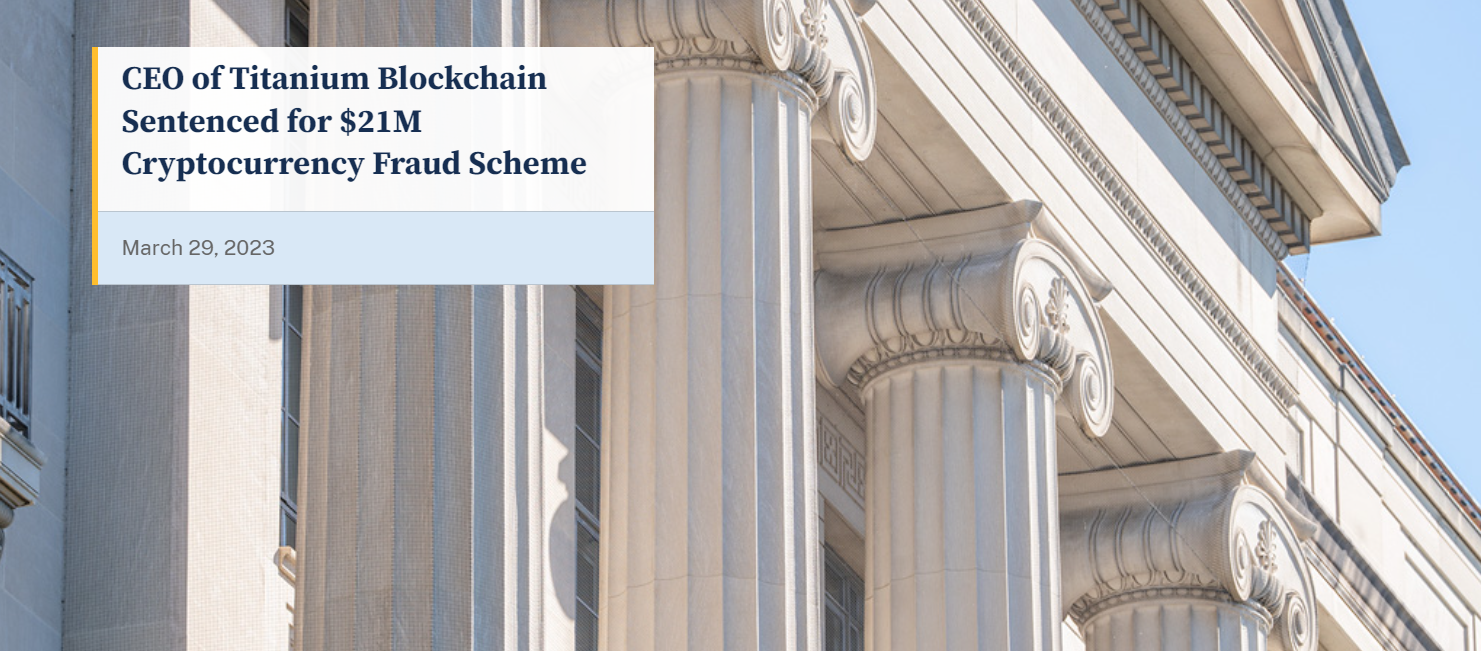
The CEO of Titanium Blockchain Infrastructure Services Inc. (TBIS), Michael Alan Stollery, was sentenced to four years and three months in prison for orchestrating a $21 million cryptocurrency fraud scheme involving an unregistered ICO.
Stollery lured investors by falsifying white papers and planting fake testimonials on Titanium Blockchain’s website, creating an illusion of legitimacy. He also falsely claimed to have business relationships with the Federal Reserve and prominent companies.
Instead of using the ICO funds for TBIS’s intended purposes, Stollery commingled the investors’ money with his personal finances and spent a portion of it on unrelated expenses. In July 2022, Stollery pleaded guilty to one count of securities fraud and faced up to 20 years in prison. His conviction underscores the importance of due diligence and regulatory compliance in the rapidly evolving world of cryptocurrencies and ICOs.
The Fraudulent Scheme
Stollery advertised Titanium Blockchain as a lucrative cryptocurrency investment platform, enticing investors to purchase “BARs,” the cryptocurrency token offered by TBIS’s ICO. He made several false and misleading statements to attract potential investors.
Despite being legally required to do so, Stollery did not register the ICO with the U.S. Securities and Exchange Commission (SEC), nor did he have a valid exemption from the SEC’s registration requirements.
Misleading White Papers and Fake Testimonials
To lure investors, Stollery fabricated aspects of Titanium Blockchain’s white papers, which were supposed to provide an overview of the cryptocurrency investment offering, including its purpose, technology, and profitability prospects.
He also planted fake client testimonials on Titanium Blockchain website, giving the false impression of satisfied investors. Additionally, Stollery falsely claimed to have business relationships with the Federal Reserve and numerous prominent companies, further creating an illusion of legitimacy.
Misuse of Invested Funds
Instead of utilizing the funds for Titanium Blockchain’s intended purposes, Stollery commingled the ICO investors’ funds with his personal finances. A portion of the offering proceeds was spent on unrelated expenses, such as credit card payments and bills for his Hawaii condominium.

Investigation and Prosecution
The FBI Los Angeles Field Office and the Federal Reserve Board Office of Inspector General (OIG) Western Region, San Francisco Office, led the investigation.
Assistant Attorney General Kenneth A. Polite, Jr. of the Justice Department’s Criminal Division; Assistant Director Luis Quesada of the FBI’s Criminal Investigative Division; and Acting Special Agent in Charge Cory Nootnagel of the OIG for the Board of Governors of the Federal Reserve System and the Consumer Financial Protection Bureau, Western Region, announced Stollery’s sentencing.
In July 2022, Stollery pleaded guilty to one count of securities fraud for his role in the fraudulent scheme. Although he faced up to 20 years in prison, he was sentenced to four years and three months.
Wider Implications for ICOs and Cryptocurrency Investments
This case highlights the ongoing risks associated with initial coin offerings (ICOs). In 2022 alone, 14 of the 30 total enforcement actions involved ICOs, with more than half of them containing fraud allegations. The SEC remains vigilant in pursuing actions against unregistered securities offerings, considering tokens issued in ICO-related transactions as investment contracts subject to regulation and enforcement. The U.S. Supreme Court’s Howey test serves as the basis for the SEC’s approach to ICOs.
Abe Chernin, Vice President of Cornerstone Research and co-head of its FinTech practice, noted an increase in assistance to the SEC from external agencies and organizations during cryptocurrency-related investigations under the Gensler administration.
This collaboration signifies a growing commitment to ensuring compliance and cracking down on fraudulent activities within the cryptocurrency and ICO landscape.
Conclusion
The Titanium Blockchain fraud case serves as a cautionary tale for investors and regulators alike, emphasizing the importance of due diligence and regulatory compliance in the ever-evolving world of cryptocurrencies and ICOs. Investors should be wary of seemingly attractive investment opportunities that lack transparency and proper registration with regulatory bodies. Meanwhile, regulators must continue to adapt their strategies and collaborate with other agencies to protect investors from fraudulent schemes and maintain the integrity of the cryptocurrency market.
